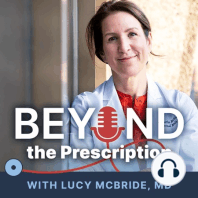76 min listen

Dr. Rachel Zoffness on Re-Conceptualizing Pain & Pain Management
Dr. Rachel Zoffness on Re-Conceptualizing Pain & Pain Management
ratings:
Length:
53 minutes
Released:
Jun 5, 2023
Format:
Podcast episode
Description
You can also check out this episode on Spotify!Pain is an inevitable part of life. But did you know that pain is not just about body parts?Dr. Rachel Zoffness is an Assistant Clinical Professor at UCSF and leading global pain expert who is revolutionizing the way we conceptualize pain. She explains that hurt (pain) and harm (damage) are not the same—and that pain is never purely biological. Similarly, treating pain is never just about pills. It’s about addressing the social-emotional context around it. On this episode, Dr. Zoffness sits down with Dr. McBride to discuss how thoughts and feelings inform the experience of pain. And how treating pain must include treating the brain. Join Dr. McBride every Monday for a new episode of Beyond the Prescription.You can subscribe on Apple Podcasts, Spotify, or on her Substack at https://lucymcbride.substack.com/podcast. You can sign up for her free weekly newsletter at lucymcbride.substack.com/welcome.Please be sure to like, rate, review — and enjoy — the show!Transcript of the podcast is here![00:00:00] Dr. McBride: Hello, and welcome to my office. I'm Dr. Lucy McBride, and this is Beyond the Prescription, the show where I talk with my guests like I do my patients, pulling the curtain back on what it means to be healthy, redefining health as more than the absence of disease. As a primary care doctor for over 20 years, I've realized that patients are much more than their cholesterol and their weight, that we are the integrated sum of complex parts.[00:00:33] Our stories live in our bodies. I'm here to help people tell their story to find out are they okay, and for you to imagine and potentially get healthier from the inside out. You can subscribe to my weekly newsletter at and to the show on Apple Podcasts, Spotify, or wherever you get your podcasts. So let's get into it and go Beyond the Prescription.[00:01:02] I'm delighted to welcome to the podcast my friend Rachel Zoffness. Dr. Zoffness is a PhD, pain psychologist, assistant clinical professor at UCSF, and an author of a new book called The Pain Management Workbook. She believes like I do, that our bodies and minds are inseparable and that we need to think about pain in a much more nuanced way.[00:01:25] In other words, when I was trained in medical school, we thought pain was about the body part and that pills were the solution. When actually, as doctors, we describe pain as a biopsychosocial phenomenon. Rachel, I am so happy you're here today. Thank you for joining me.[00:01:42] Dr. Zoffness: Thank you for inviting me on, Dr. McBride.[00:01:45] Dr. McBride: What I love about you is that we agree that mental and physical health are inseparable. When I was training in medical school in the 1990s and early 2000s, we were taught that pain was about the body part itself, and that we used medicines to treat pain. We used Tylenol, Advil, opiates, and we were taught to get ahead of the pain and to get people more opiates than we thought they might need because it was cruel to deprive people of pain meds, which of course it is in many ways.[00:02:16] But we now know just how addicting these medications are, and we also know that pain is about more than the limb that is hurting. So could you describe for me how you talk about pain, this bio psychosocial model? Because it's a big word and I'd love to break it down.[00:02:34] Dr. Zoffness: Yeah, it's sort of frustrating for people who have been living with pain and also for healthcare providers who treat pain because medicine, as you know, has been rooted in this antiquated, dinosaur era biomedical model, which teaches people that everything to do with pain is just anatomy and physiology.[00:02:54] But neuroscience has known for many decades that that's not actually true when it comes to pain. And one of the reasons we know this is because of this syndrome called phantom limb pain. And phantom limb pain is when someone loses a limb and arm or a leg, and they continue to have terrible pain in
Released:
Jun 5, 2023
Format:
Podcast episode
Titles in the series (66)
Greg Galeazzi on his Tour of Duty in Afghanistan: Resilience. Recovery. Hope. Few people embody these words like Greg Galeazzi—a U.S. Army veteran, doctor, and dedicated husband and father. While deployed in Afghanistan in 2011, Greg’s platoon was hit by an IED during a regular foot... by Beyond the Prescription